Under one moon | Drifters in China and afar share cherished Mid-Autumn Festival traditions
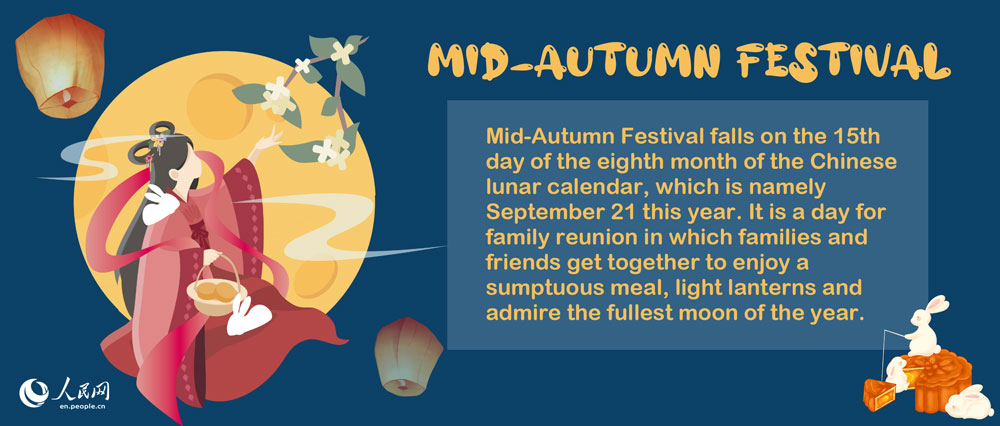
As if by clockwork, queues start to form at swanky stores and pastry shops every September as salivating Chinese vie for platters of premium mooncakes to celebrate the Mid-Autumn Festival, which falls on the 15th day of the eighth month of the Chinese lunar calendar, which is namely September 21 this year.
As an old saying goes, "people and the moon reunited to form a full circle." The Mid-Autumn Festival is a day of family reunion where families and friends get together to enjoy a sumptuous meal, light lanterns, and admire the fullest moon of the year. In the past, people would celebrate a year of hard work after the harvest, showing gratitude for the moon whose cycles are closely associated with agricultural production.
With the Mid-Autumn Festival being less than several days away, the country has already started to revel in a festive atmosphere and is abuzz with anticipation. Delighted people are itching to enjoy a vast assortment of festive treats with their loved one. However, for those drifting far away from home, the Mid-autumn Festival is a time for them to spew out their pent-up homesickness. People's Daily Online interviewed three young drifters living in China and around the world, unraveling their most cherished activities during the Mid-Autumn Festival.
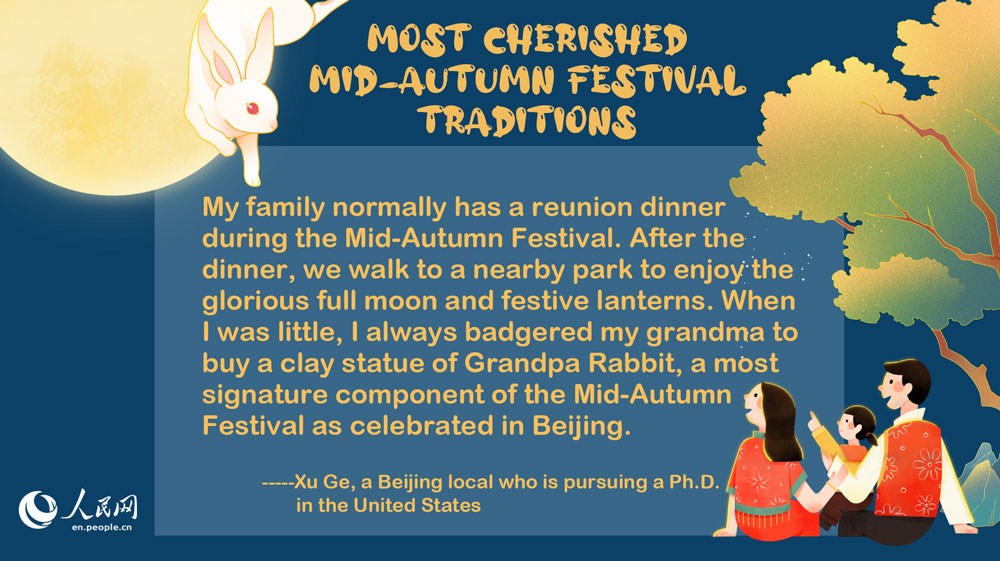
"The essence of the Mid-Autumn festival is family reunion"
From festival-themed carnivals to lantern shows, overseas Chinese communities always hold a grand celebration during the Mid-Autumn Festival. "Seeking comfort in tradition is our way to ease the homesickness," said Xu Ge, a Beijing local who is pursuing a Ph.D. in the United States.
Every year, all members of Xu's family get together, sharing a reunion dinner. After dinner, they will walk to a nearby park to enjoy the glorious full moon and festive lanterns. In Xu's mind, the most significant component for the Mid-Autumn Festival in Beijing is not the moon cakes, but Tu'Er Ye or Grandpa Rabbit.
The origin of Grandpa Rabbit is rooted in a Beijing fairy tale: Once upon a time, a plague was raging in Beijing. A jade rabbit who lived on the moon took pity and descended to the earth to pour its medicine into water wells and in this way healed the sick. Thanks to the rabbit, Beijingers recovered. Since then, Grandpa Rabbit has become the guardian deity of Beijing.
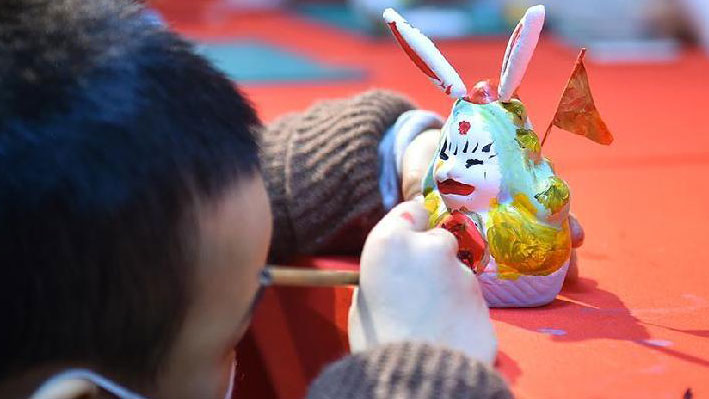
(Photo/Chinanews.com)
"When I was little, I always badgered my grandma to buy a clay statue of Grandpa Rabbit – with the anthropomorphic rabbit sitting astride a tiger – during the Mid-Autumn Festival as I believed it could give me good luck," said Xu. "Grandpa Rabbit relays the sweetest moments of the Mid-Autumn Festival with my family."
"In the past, I didn't realize the significance of the Mid-Autumn Festival, viewing it as a normal day when family stayed together and held small talk," said Xu. "Now, when I remember it, I feel very warm."
Due to the COVID-19 pandemic, Xu can only celebrate the Mid-Autumn Festival alone this year. When asked how she would celebrate the festival, Xu said she was not in the mood to celebrate it alone. But she will eat mooncakes and spend time video chatting with her family located far away in Beijing. "The essence of the Mid-Autumn Festival is family reunion, and celebrating it alone would only increase my homesickness," she said.

"Mid-Autumn Festival is my favorite festival in China"
Across the Pacific Ocean, another drifter in Xu Ge's hometown of Beijing also cannot reunite with her family during the Mid-Autumn Festival. Annemarie Li (Anne) is a German woman who has stayed in China for more than four years, with the Mid-Autumn Festival being her favorite festival in China. It's an annual routine for Anne and her husband to visit their family in the latter's hometown of Baoding, north China's Hebei Province.
"Our family's holiday ritual lies in eating mooncakes," said Anne. Every year, Anne's grandma-in-law would make the food herself to satisfy their families' mooncake cravings and they always would rip open the mooncakes together. "The homemade mooncake tastes much better than the commercial one as they are stuffed with grandma's love," she said. Even Anne's parents are a big fan of her grandma-in-law's mooncakes, as she sometimes would bring the homemade mooncakes back to Germany. "Because of me, my parents are familiar with this traditional Chinese holiday and they love mooncakes."
For Anne, a three-day break for family reunion is too short and she cannot bear to tear herself away from her family so quickly. But every time she leaves, her grandparents would send along as many mooncakes as possible in their suitcases as they worried Anne and her husband would have no chance to eat their own homemade mooncakes in Beijing. "When we return to Beijing, we seldom eat it. We don't know why these mooncakes just don't taste the same as we ate at grandma's home," she said. "Even if we left it in the fridge for months, we always look forward to eating grandma-in-law's mooncakes next year."
This is Anne's first year that she cannot celebrate the Mid-Autumn Festival with her family-in-law in Baoding. "I feel sad that I cannot reunite with my family and eat fresh mooncakes this year," said Anne. "The moon is getting rounder and lighter, and I already anticipate its glorious moment. I will ask my parents in Germany and families in Baoding to admire the full moon with me simultaneously."
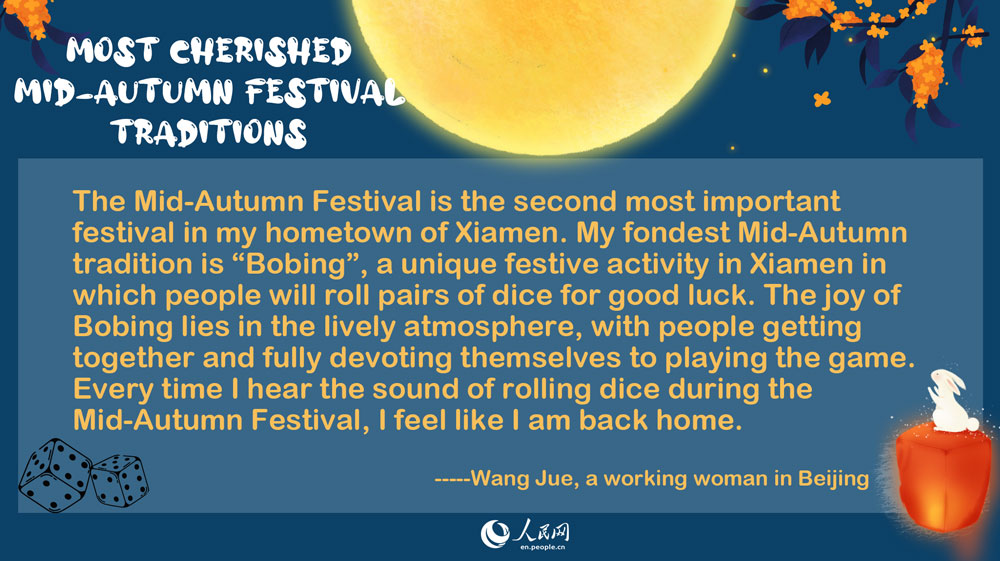
"Mid-Autumn Festival is the time to make merry with families and friends"
Like Anne, plenty of people in Beijing cannot reunite with their families for this year's Mid-Autumn Festival. Wang Jue, a working woman in Beijing, is among them. She just refunded her plane ticket a few days ago when her hometown of Xiamen, a coastal city in southeast China's Fujian Province, reported dozens of COVID-19 cases. "I am regretful that I cannot celebrate the Mid-Autumn Festival with my family as it is the second most important festival in my hometown," said Wang.
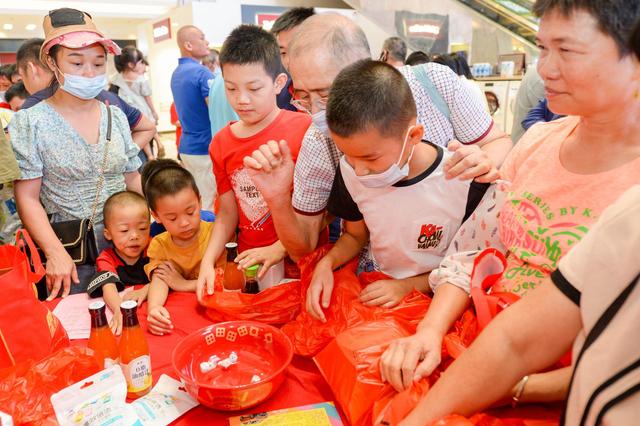
(Photo/Taihainet.com)
In Xiamen, the celebration starts almost a month before the Mid-Autumn Festival. "When walking along the city streets around this festival, you will hear the pleasant silvery sound of dice rolling, cheers of winning or losing everywhere," said Wang. These sounds come from a unique festive activity in Xiamen called "Bobing" (Mooncake Dice Game), which involves a combination of culture, folk customs and recreational activities.
The game has been maintained as a Mid-Autumn custom by the locals for hundreds of years, forming a part of the city's own particular mooncake culture. Bobing is a highly enjoyable game in which people throw dice into a bowl, with the different pips they get standing for the different ranks of awards they can win. Those who play the game believe that the player who rolls the top prize, called "Zhuangyuan", will enjoy a year of good fortune.
"Bobing is my fondest Mid-Autumn tradition as it is a time to make merry with families and friends," said Wang. "Everyone is excited during the game. The joy of Bobing lies in the lively atmosphere where people gather together and are fully devoted to the game."
Every year, Wang attends dozes of Bobing activities, and did so even when she studied abroad. "My friends would organize the Bobing activity in turns, aiming to distract us from homesickness in the United States," said Wang. "Even if I am not familiar with some people attending the activity, we can quickly grow closer when we start to play as we all share the same folk culture."
Wang plans to organize a Bobing activity this year, inviting her high school friends who also live in Beijing to join. She hopes the activity can bring cheerfulness and happiness to her friends. "Every time I hear the sound of rolling dice during the Mid-Autumn Festival, I feel like I am back home."
Photos
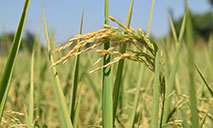 Bumper harvest presents a magnificent scene of terraced rice paddies in SW China's Luzhou city
Bumper harvest presents a magnificent scene of terraced rice paddies in SW China's Luzhou city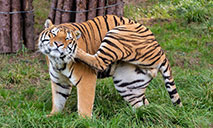 In pics: life of Siberian tigers in NE China's breeding center
In pics: life of Siberian tigers in NE China's breeding center Explore wonderland created by an alpine lake cluster in SW China's Yunnan
Explore wonderland created by an alpine lake cluster in SW China's Yunnan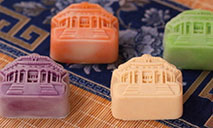 In pics: Museums across China unveil creative and culturally-inspired mooncakes
In pics: Museums across China unveil creative and culturally-inspired mooncakes
Related Stories
- National Day, Mid-Autumn Festival celebrated on Fuxing bullet train
- Beijing and Paris come together in cultural event to celebrate Mid-Autumn Festival
- China's border police reunite with their families to celebrate Mid-Autumn Festival, National Day
- How to make mooncakes for Mid-Autumn Festival
- Lantern fair held in Jiangsu to celebrate Mid-Autumn Festival
Copyright © 2021 People's Daily Online. All Rights Reserved.






